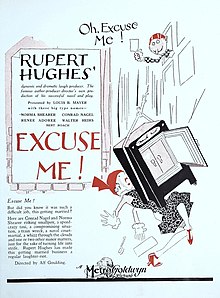| Excuse Me | |
|---|---|
 Advertisement drawn by John Held Jr. Advertisement drawn by John Held Jr. | |
| Directed by | Alfred J. Goulding |
| Screenplay by | Rupert Hughes |
| Based on | Excuse Me by Rupert Hughes |
| Produced by | Louis B. Mayer |
| Starring | Conrad Nagel Norma Shearer Renée Adorée |
| Cinematography | John W. Boyle |
| Distributed by | Metro-Goldwyn-Mayer |
| Release date |
|
| Running time | 60 minutes |
| Country | United States |
| Language | Silent (English intertitles) |
Excuse Me is a 1925 American silent comedy film starring Norma Shearer and Conrad Nagel. It was directed by Alfred J. Goulding, and based on the 1911 play of the same name written by best-selling novelist Rupert Hughes. The comedy concerns naval officer Harry Mallory and his would-be bride Marjorie Newton who spend most of their time running up and down a train looking for a clergyman to marry them.
Excuse Me is a remake of a 1915 film with the same name.
Plot
As described in a review in a film magazine, promoted for bravery and ordered to catch a boat to the Philippines, Lt. Harry Mallory's (Nagel) sweetheart Marjorie Newton (Shearer) decides that she will go with him. There is a mad scramble to get a minister, but to no avail. Just as Marjorie is bidding Harry goodbye at the train station, he spies a minister getting aboard so he yanks her on the train. They fail to find the minister anywhere on the train, and with night coming, Harry and Marjorie have a terrible row about his taking her and the sleeping arrangements, so Harry sleeps in the wash room. In the morning, Marjorie in disgust plans to leave the train when Francine (Adorée), an old sweetheart of Harry, boards the train with her little boy. Marjorie comes back onboard and is horrified when the boy calls Henry "papa." Francine had taught the boy to do this to fool detectives that are seeking to take the boy away. This situation is all fixed, and then the train pulls into a station where there is a convention of ministers. Harry is trying to corral one when the train leaves, so he hires an airplane to catch the train at the next station. From the air, he sees that a trestle of a bridge ahead of the train is on fire, and makes a daring transfer from the airplane to the train to warn about the bridge. The engineer stops the train, but some of the cars overturn, and the engine with Harry in it hangs over the edge. Harry is rescued, all journey to San Francisco where Harry and Marjorie marry, and they catch a ship for the Philippines.
Cast
- Norma Shearer as Marjorie Newton
- Conrad Nagel as Harry Mallory
- Renée Adorée as Francine
- Walter Hiers as Porter
- John Boles as Lt. Shaw
- Bert Roach as Jimmy Wellington
- William V. Mong as Rev. Dr. Temple
- Edith Yorke as Mrs. Temple
- Gene Cameron as Lt. Hudson
- Fred Kelsey as George Ketchem
- Paul Weigel as Rev. Job Wales
- Mai Wells as Mrs. Job Wales
- Lassie Lou Ahern as Bit part (uncredited)
- Peggy Ahern as Bit part (uncredited)
- Jack Edwards as Bit part (uncredited)
- Evelyn Peirce as Bit part (uncredited)
- Dick Sutherland as Bit part (uncredited)
Preservation
With no prints of Excuse Me located in any film archives, it is a lost film.
References
- White Munden, Kenneth, ed. (1997). The American Film Institute Catalog of Motion Pictures Produced in the United States: Feature Films, 1921-1930. University of California Press. p. 221. ISBN 0-520-20969-9.
- Excuse Me at silentera.com
- Sewell, Charles S. (February 7, 1925). "Excuse Me; Metro-Goldwyn Offers Amusing Version of Rupert Hughes Stage Farce, with Thrilling Climax". The Moving Picture World. 72 (6). New York City: Chalmers Publishing Co.: 557–558. Retrieved August 23, 2021.
- Library of Congress American Silent Feature Film Survival Database: Excuse Me
External links
This article about a silent comedy film from the 1920s is a stub. You can help Misplaced Pages by expanding it. |
- 1925 films
- 1925 comedy films
- 1925 lost films
- 1920s American films
- 1920s English-language films
- American black-and-white films
- American films based on plays
- American silent feature films
- Films directed by Alfred J. Goulding
- Films with screenplays by Rupert Hughes
- Lost American comedy films
- Metro-Goldwyn-Mayer films
- Silent American comedy films
- 1920s silent comedy film stubs